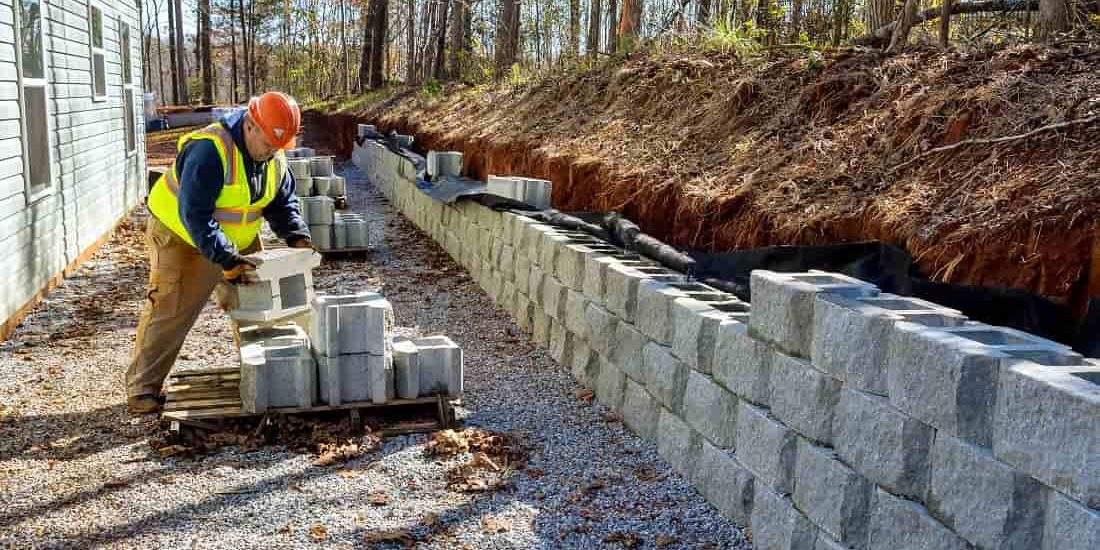In the realm of commercial construction and landscaping, the role of commercial retaining wall contractors is indispensable. These structures are not only functional, serving to hold back soil and prevent erosion, but they also contribute significantly to the aesthetic appeal and overall value of a property. In this guide, we delve deep into the world of commercial retaining wall contractors, offering insights into their importance, the variety of retaining walls available, and tips on selecting the right contractor for your project.
Commercial Retaining Walls
Understanding the Purpose of Retaining Walls in Commercial Projects
Retaining walls play a critical role in commercial construction projects. They provide necessary support to large masses of soil, maintaining the integrity of a landscape and preventing the potential hazards of soil erosion and surface runoff. The expertise of commercial retaining wall contractors is crucial in ensuring these walls are constructed with precision and durability.
The Importance of Professional Contractors for Retaining Walls
Commercial retaining wall contractors bring a wealth of experience and specialized skills to the table. Their knowledge in selecting the right materials, understanding soil dynamics, and adhering to construction codes ensures that your retaining wall is not only aesthetically pleasing but also structurally sound and compliant with local regulations.
Key Considerations Before Starting a Retaining Wall Project
Before embarking on a retaining wall project, several factors need consideration. These include the wall’s purpose, the type of soil, the wall’s height, and the overall landscape design. Consulting with experienced commercial retaining wall contractors can help clarify these aspects and aid in making informed decisions.
Types of Retaining Walls in Commercial Construction
Gravity Walls: Basics and Benefits
Gravity walls rely on their weight to retain soil, often constructed from concrete or stone. They are a popular choice among commercial retaining wall contractors due to their simplicity in design and effectiveness in low-height applications.
Cantilevered Walls: Design and Application
Cantilevered walls are engineered with a base slab that extends into the retained soil. This design makes them suitable for taller applications. Commercial retaining wall contractors often recommend this type for its efficient use of materials and space.
Anchored Walls: When and Why to Use Them
For scenarios requiring additional strength, anchored walls are the go-to choice. These walls use anchors driven deep into the soil and connected to the wall, providing extra support. They are ideal for challenging soil conditions or when constructing high walls.
Selecting the Right Commercial Retaining Wall Contractors
Evaluating Experience and Track Record
When choosing commercial retaining wall contractors, their experience in handling various projects is a key factor. A contractor with a proven track record in building retaining walls similar to your needs is more likely to deliver quality results.
Checking Licenses, Certifications, and Insurance
It’s crucial to verify that your chosen commercial retaining wall contractors are licensed and insured. This protects you from liability and ensures they adhere to industry standards.
The Role of Client Testimonials and Portfolios
Client testimonials and portfolios provide insight into the contractor’s work quality and customer service. Experienced commercial retaining wall contractors will have a portfolio showcasing their past projects and client feedback.
Material Choices for Commercial Retaining Walls
Concrete: Durability and Versatility
Concrete is a popular choice among commercial retaining wall contractors for its strength and versatility. It can be molded into various shapes and finishes, making it suitable for different aesthetic preferences.
Stone and Masonry: Aesthetic Appeal and Strength
Stone and masonry offer a natural and timeless look. Commercial retaining wall contractors often recommend these materials for their durability and resistance to weather elements.
Choosing Eco-Friendly and Sustainable Materials
With growing environmental concerns, many commercial retaining wall contractors are now offering sustainable material options like recycled concrete or sustainably sourced stones.
Design Considerations and Customization
Understanding Soil and Environmental Factors
Commercial retaining wall contractors must consider soil type, drainage, and environmental factors. This ensures the wall’s design is tailored to withstand local conditions.
Aesthetics and Functional Design in Commercial Spaces
A retaining wall should blend function and form. Contractors can help design walls that not only serve their purpose but also enhance the property’s aesthetic appeal.
Customization Options with Professional Contractors
Professional commercial retaining wall contractors can offer various customization options, from integrated lighting to unique textures and colors, to match the client’s vision.
The Construction Process of Retaining Walls
Site Preparation and Safety Measures
Before construction, commercial retaining wall contractors ensure the site is properly prepared and all safety measures are in place, minimizing disruptions and hazards.
Steps in Building a Durable Retaining Wall
The construction process involves several steps, including foundation laying, backfilling, and drainage systems, all critical for the wall’s longevity and effectiveness.
Quality Assurance and Compliance with Standards
Reputable commercial retaining wall contractors adhere to quality assurance practices and comply with building codes and standards, ensuring a safe and lasting structure.
Cost Factors and Budgeting for Retaining Wall Projects
Estimating the Cost: What Influences the Price
The cost of constructing a retaining wall can vary widely. Factors like materials, wall size, design complexity, and geographical location play significant roles. Experienced commercial retaining wall contractors can provide detailed estimates to help plan your budget.
How to Budget Effectively for Your Project
Effective budgeting involves understanding all potential costs and allocating funds accordingly. It’s wise to discuss your budget with commercial retaining wall contractors and consider setting aside a contingency fund for unexpected expenses.
Negotiating with Contractors for the Best Value
While price is a crucial factor, the cheapest option isn’t always the best. Skilled commercial retaining wall contractors may cost more but can offer better value through quality workmanship and durable materials.
Maintenance and Longevity of Commercial Retaining Walls
Routine Maintenance Tips for Longevity
Regular maintenance is key to extending the life of your retaining wall. Commercial retaining wall contractors can advise on proper maintenance routines, which might include cleaning, inspecting for damage, and ensuring proper drainage.
Identifying and Addressing Common Issues
Over time, retaining walls may face issues like cracking or bulging. Identifying these early and consulting with commercial retaining wall contractors for repairs is crucial to maintaining the wall’s integrity.
When to Seek Professional Repairs
For significant issues, professional intervention is necessary. Experienced commercial retaining wall contractors can assess the damage and perform the required repairs to restore the wall’s functionality and appearance.
Legal and Regulatory Considerations
Understanding Local Zoning Laws and Regulations
Every region has its zoning laws and regulations regarding construction. Commercial retaining wall contractors should be well-versed in these regulations to ensure your project complies with local codes.
The Importance of Permits and Compliance
Obtaining the necessary permits is a critical step that commercial retaining wall contractors should manage. Compliance with local building codes not only ensures safety but also avoids legal complications.
Working with Contractors to Ensure Legal Adherence
Choose commercial retaining wall contractors who prioritize legal adherence. They should handle all aspects of compliance, from obtaining permits to following environmental regulations.
Frequently Asked Questions (FAQs)
What do commercial retaining wall contractors do?
Commercial retaining wall contractors specialize in designing, constructing, and maintaining retaining walls for commercial properties. They ensure these structures are built to handle specific soil conditions and meet both aesthetic and functional requirements.
How much does it cost to hire a commercial retaining wall contractor?
The cost can vary based on the project’s complexity, the materials used, the wall’s size, and the geographical location. It’s best to get a detailed estimate from several contractors for a more accurate idea.
What are the key factors to consider when selecting a retaining wall contractor?
Important factors include the contractor’s experience, portfolio of past projects, client testimonials, licensing, insurance, and their ability to adhere to local building codes and regulations.
How long does it take to build a commercial retaining wall?
The timeline can vary greatly depending on the wall’s size and complexity. Smaller projects may take a few days, while larger, more complex walls could take several weeks or more.
What materials are commonly used by retaining wall contractors?
Common materials include concrete blocks, poured concrete, stone, brick, and wood. The choice of material depends on the project’s requirements and aesthetic goals.
Do I need a permit to build a commercial retaining wall?
In most cases, yes. Commercial retaining wall contractors typically handle the permitting process, ensuring that all work complies with local zoning laws and building codes.
Can retaining walls help with water drainage issues?
Yes, properly designed and constructed retaining walls can help manage water drainage and prevent erosion. Contractors often incorporate drainage solutions into the wall design.
How do I maintain a retaining wall?
Maintenance tips include regular inspections for signs of damage, ensuring proper drainage, cleaning the wall surface, and addressing minor repairs promptly.
What is the lifespan of a commercial retaining wall?
The lifespan varies based on the material and construction quality. Well-built and properly maintained walls can last several decades.
Can commercial retaining wall contractors repair existing walls?
Yes, most contractors are equipped to assess and repair existing retaining walls, addressing issues like structural damage, erosion, or drainage problems.
Conclusion
A well-constructed retaining wall offers long-term benefits, including enhanced property aesthetics, increased usable space, and prevention of soil erosion. Choosing the right commercial retaining wall contractors is essential to achieving these benefits.
The success of your retaining wall project largely depends on the contractor you choose. Look for commercial retaining wall contractors who understand your vision, communicate effectively, and have a proven track record of successful projects.
In conclusion, the right commercial retaining wall contractors can make a significant difference in the success of your project. From the initial planning stages to the final construction, their expertise, experience, and attention to detail are invaluable. Remember, your retaining wall is not just a structural element; it’s an investment in the safety and aesthetics of your commercial property.







